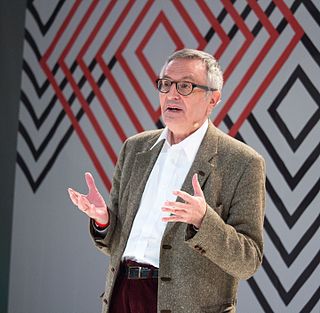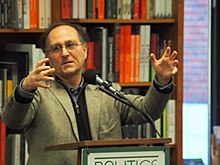
Epistemology, or the theory of knowledge, is the branch of philosophy concerned with knowledge. Epistemology is considered a major subfield of philosophy, along with other major subfields such as ethics, logic, and metaphysics.

Pragmatism is a philosophical tradition that considers words and thought as tools and instruments for prediction, problem solving, and action, and rejects the idea that the function of thought is to describe, represent, or mirror reality. Pragmatists contend that most philosophical topics—such as the nature of knowledge, language, concepts, meaning, belief, and science—are all best viewed in terms of their practical uses and successes.

Deliberation is a process of thoughtfully weighing options, for example prior to voting. Deliberation emphasizes the use of logic and reason as opposed to power-struggle, creativity, or dialogue. Group decisions are generally made after deliberation through a vote or consensus of those involved.
Deliberative democracy or discursive democracy is a form of democracy in which deliberation is central to decision-making. Deliberative democracy seeks quality over quantity by limiting decision-makers to a smaller but more representative sample of the population that is given the time and resources to focus on one issue.

Richard McKay Rorty was an American philosopher. Educated at the University of Chicago and Yale University, he had strong interests and training in both the history of philosophy and in contemporary analytic philosophy. Rorty's academic career included appointments as the Stuart Professor of Philosophy at Princeton University, Kenan Professor of Humanities at the University of Virginia, and Professor of Comparative literature at Stanford University. Among his most influential books are Philosophy and the Mirror of Nature (1979), Consequences of Pragmatism (1982), and Contingency, Irony, and Solidarity (1989).

"Pragmaticism" is a term used by Charles Sanders Peirce for his pragmatic philosophy starting in 1905, in order to distance himself and it from pragmatism, the original name, which had been used in a manner he did not approve of in the "literary journals". Peirce in 1905 announced his coinage "pragmaticism", saying that it was "ugly enough to be safe from kidnappers". Today, outside of philosophy, "pragmatism" is often taken to refer to a compromise of aims or principles, even a ruthless search for mercenary advantage. Peirce gave other or more specific reasons for the distinction in a surviving draft letter that year and in later writings. Peirce's pragmatism, that is, pragmaticism, differed in Peirce's view from other pragmatisms by its commitments to the spirit of strict logic, the immutability of truth, the reality of infinity, and the difference between (1) actively willing to control thought, to doubt, to weigh reasons, and (2) willing not to exert the will, willing to believe. In his view his pragmatism is, strictly speaking, not itself a whole philosophy, but instead a general method for the clarification of ideas. He first publicly formulated his pragmatism as an aspect of scientific logic along with principles of statistics and modes of inference in his "Illustrations of the Logic of Science" series of articles in 1877-8.
Clarence Irving Lewis, usually cited as C. I. Lewis, was an American academic philosopher. He is considered the progenitor of modern modal logic and the founder of conceptual pragmatism. First a noted logician, he later branched into epistemology, and during the last 20 years of his life, he wrote much on ethics. The New York Times memorialized him as "a leading authority on symbolic logic and on the philosophic concepts of knowledge and value." He was the first to coin the term "Qualia" as it is used today in philosophy, linguistics, and cognitive sciences.

Applied philosophy is a branch of philosophy that studies philosophical problems of practical concern. The topic covers a broad spectrum of issues in environment, medicine, science, engineering, policy, law, politics, economics and education. The term was popularised in 1982 by the founding of the Society for Applied Philosophy by Brenda Almond, and its subsequent journal publication Journal of Applied Philosophy edited by Elizabeth Brake. Methods of applied philosophy are similar to other philosophical methods including questioning, dialectic, critical discussion, rational argument, systematic presentation, thought experiments and logical argumentation.
A pragmatic theory of truth is a theory of truth within the philosophies of pragmatism and pragmaticism. Pragmatic theories of truth were first posited by Charles Sanders Peirce, William James, and John Dewey. The common features of these theories are a reliance on the pragmatic maxim as a means of clarifying the meanings of difficult concepts such as truth; and an emphasis on the fact that belief, certainty, knowledge, or truth is the result of an inquiry.

Modern philosophy is philosophy developed in the modern era and associated with modernity. It is not a specific doctrine or school, although there are certain assumptions common to much of it, which helps to distinguish it from earlier philosophy.

John Nicholas Gray is an English political philosopher and author with interests in analytic philosophy, the history of ideas, and philosophical pessimism. He retired in 2008 as School Professor of European Thought at the London School of Economics and Political Science. Gray contributes regularly to The Guardian, The Times Literary Supplement and the New Statesman, where he is the lead book reviewer. He is an atheist.
Neopragmatism, sometimes called post-Deweyan pragmatism, linguistic pragmatism, or analytic pragmatism, is the philosophical tradition that infers that the meaning of words is a result of how they are used, rather than the objects they represent.

This Charles Sanders Peirce bibliography consolidates numerous references to the writings of Charles Sanders Peirce, including letters, manuscripts, publications, and Nachlass. For an extensive chronological list of Peirce's works, see the Chronologische Übersicht on the Schriften (Writings) page for Charles Sanders Peirce.

The Public and Its Problems is a 1927 book by American philosopher John Dewey. In his first major work on political philosophy, Dewey explores the viability and creation of a genuinely democratic society in the face of the major technological and social changes of the 20th century, and seeks to better define what both the 'public' and the 'state' constitute, how they are created, and their major weaknesses in understanding and propagating their own interests and the public good. Dewey rejects a then-popular notion of political technocracy as an alternative system of governing an increasingly complex society, but rather sees democracy as the most viable and sustainable means to achieving the public interest, albeit a flawed and routinely subverted one. He contends that democracy is an ethos and an ongoing project that requires constant public vigilance and engagement to be effective, rather than merely a set of institutional arrangements, an argument he would later expand upon most influentially in his essay "Creative Democracy: The Task Before Us". The Public and its Problems is a major contribution on pragmatism in political philosophy and continued to promote discussion and debate long after its publication.

Richard Jacob Bernstein was an American philosopher who taught for many years at Haverford College and then at The New School for Social Research, where he was Vera List Professor of Philosophy. Bernstein wrote extensively about a broad array of issues and philosophical traditions including American pragmatism, neopragmatism, critical theory, deconstruction, social philosophy, political philosophy, and hermeneutics.

Pragmatic ethics is a theory of normative philosophical ethics and meta-ethics. Ethical pragmatists such as John Dewey believe that some societies have progressed morally in much the way they have attained progress in science. Scientists can pursue inquiry into the truth of a hypothesis and accept the hypothesis, in the sense that they act as though the hypothesis were true; nonetheless, they think that future generations can advance science, and thus future generations can refine or replace their accepted hypotheses. Similarly, ethical pragmatists think that norms, principles, and moral criteria are likely to be improved as a result of inquiry.
Epistemic democracy refers to a range of views in political science and philosophy which see the value of democracy as based, at least in part, on its ability to make good or correct decisions. Epistemic democrats believe that the legitimacy or justification of democratic government should not be exclusively based on the intrinsic value of its procedures and how they embody or express values such as fairness, equality, or freedom. Instead, they claim that a political system based on political equality can be expected to make good political decisions, and possibly decisions better than any alternative form of government .
Scott F. Aikin is an American philosopher and assistant professor of philosophy at Vanderbilt University in Nashville, Tennessee, where he also holds a joint appointment in Classics. He earned an M.A. in philosophy from the University of Montana in 1999 and a Ph.D. in philosophy from Vanderbilt University in 2006. His principal areas of research are epistemology, argumentation theory, ancient philosophy, and pragmatism.

John Jeremy Stuhr is an American philosopher who teaches at Emory University. He has written extensively about a wide assortment of philosophical figures and movements as well as a broad array of cultural problems and issues. His work is known for its lively, engaged, and direct style. He draws critically on thinkers from often separated philosophical traditions. Revealing his impatience with narrow and academic conceptions of philosophy, his writings make deep and consistent use of poetry, painting, photography, and the lyrics of contemporary music, and they exhibit a broad interdisciplinary reach across fields such as rhetoric, media studies, relativity theory, political and legal theory, cultural geography, and economics.
Cheryl J. Misak is a Canadian philosopher who works in pragmatism, the history of analytic philosophy, and bioethics. She is a University Professor at the University of Toronto, a Fellow of the Royal Society of Canada, and a recipient of a Guggenheim Fellowship in intellectual and cultural history. In 2011, Misak served as president of the Charles S. Peirce Society. In December 2020, Misak became the interim director of the Munk School of Global Affairs at the University of Toronto.











